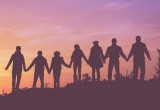Young activists from around the world met at the United Nations in New York on June 20, 2017 to discuss plans to engage youth in key nuclear disarmament initiatives.
The meeting was hosted by the Abolition 2000 Youth Working Group and organised by Marzhan Nurzhan from the Basel Peace Office. It was held during the historic negotiations on a treaty to prohibit nuclear weapons (‘ban treaty’). The Youth Working Group provides an open forum and platform for youth from peace, disarmament and sustainable development organisations to network, build cooperation and organize joint actions.
The meeting involved youth representing Amplify, Basel Peace Office, Campaign for Nuclear Disarmament, Global Security Institute, Lawyers Committee on Nuclear Policy, Nuclear Age Peace Foundation, Parliamentarians for Nuclear Non-proliferation and Disarmament, Peace Action NY State, Religions for Peace, United for Peace and Justice, and UNFOLD ZERO.
For the networking part of the meeting, each representative had a chance to introduce their organization and provide a short report on their nuclear disarmament activities.
For the campaign planning part of the meeting, the participants focused primarily on youth actions for the International Day for the Total Elimination of Nuclear Weapons (Nuclear Abolition Day, September 26) and on the United Nations High Level Conference on Nuclear Disarmament (UNHLC) which will be held in 2018.
Nuclear Abolition Day occurs when world leaders are gathered at the United Nations for the opening of the General Assembly, and just before the UN member States begin debating disarmament resolutions at the UN General Assembly. So this makes it a significant date to send messages to government and media about the importance of UN initiatives for nuclear disarmament, such as the ban treaty and the UNHLC. UNFOLD ZERO, a project affiliated with Abolition 2000, provides the global civil society platform for the International Day for the Total Elimination of Nuclear Weapons, and can assist in promoting youth actions and events.
The 2018 UNHLC provides a unique opportunity to inform, educate and engage youth in nuclear disarmament. Youth were very active in the UN high level conferences on sustainable development (which achieved the Sustainable Development Goals), climate change (which achieved the Paris Agreement) and oceans (which achieved the 14-point action plan for the ocean). Youth could help ensure similar success for the 2018 UNHLC on Nuclear Disarmament.
In the course of the youth meeting, challenging aspects were identified and discussed, including: the lack of interest of youth in the topic of nuclear disarmament, the problem of getting young people involved, the dispersal of social media activities – the low number of people reached, “re-inventing the wheel or bringing new global action?”, necessity to ensure that resources and energy invested in activities achieve maximum outreach. There were also concerns about how to ensure youth representation in the 2018 UNHLC and its preparatory meetings, whether funding would be available to participate in these, and whether it might be possible to multiply youth engagement through the use of webinars in which youth anywhere in the world can participate.
Many good ideas and proposals were presented and debated by the participants such as raising awareness via social media actions, filming short videos and organizing local events which would have an impact on national and international levels as well as through global joint actions. Several concrete examples were explored of actions that youth can take relatively easily. These included:
- Signing the petition against nuclear weapons at the ATOM project website (int`l campaign);
- Screening the powerful film “Where the wind blew” at universities or in local cinemas with the help of local peace and disarmament organizations
- Youth sending video messages to their countries’ leaders, calling on them to participate in 2018 UNHLC and to adopt concrete nuclear disarmament measures at the conference. For non-nuclear States this could be announcing their ratification of the ban treaty. For nuclear-armed and allied countries it could include adopting no-first use policies and announcing a framework to achieve a nuclear-weapon-free world;
- Asking their mayors, parliamentarians and religious leaders to endorse the joint statement ‘A Nuclear-Weapon-Free World; Our Common Good’, organized by Religions for Peace, PNND and Mayors for Peace, and which is being used to build global support for UN initiatives such as the ban treaty and the UNHLC.
Youth participating in the meeting discussed the influence of social media instruments, and agreed to promote joint hashtags #YouthAgainstNukes and #NukeFreeFuture. The participants expressed a strong desire to enhance youth cooperation and work for global nuclear disarmament.
